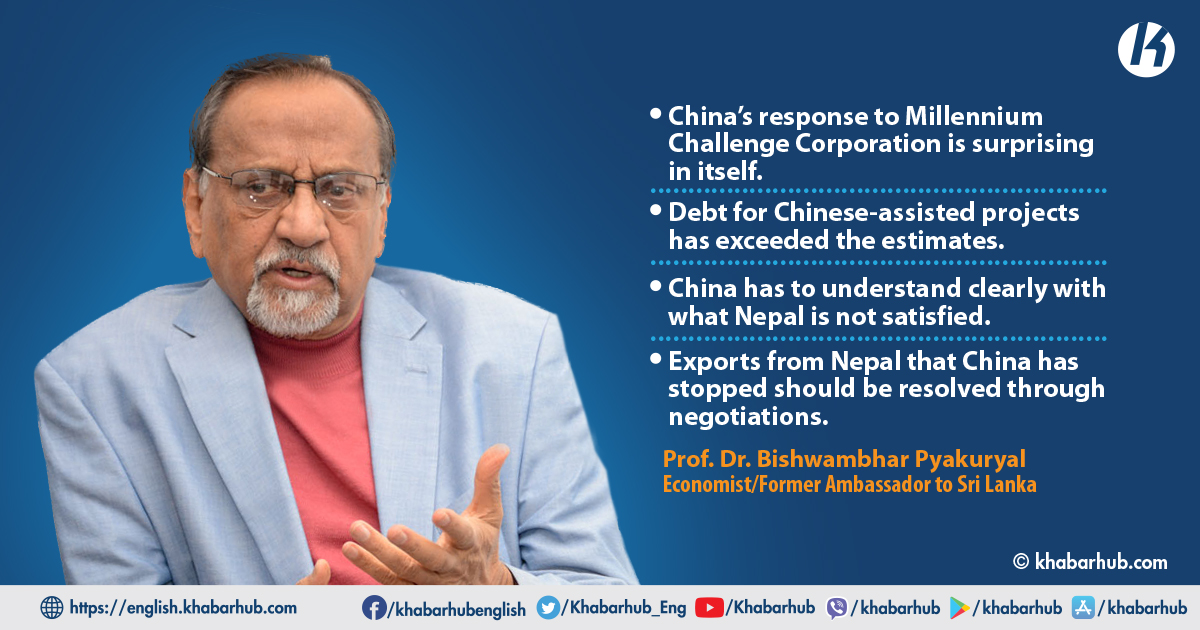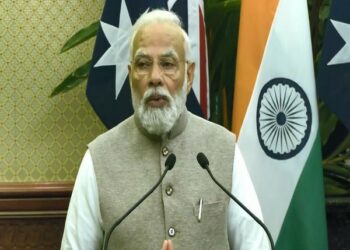Dr. Bishwambhar Pyakuryal is a distinguished economist of Nepal. He is a diplomat, writer, poet, and lyricist.
Dr. Pyakuryal, who has a doctorate in economics, has 39 years of teaching experience at Tribhuvan University. He is also a former ambassador to Sri Lanka, and has served as an economic advisor to various bodies in Nepal and abroad.
Khabarhub’s Laxman Phuyal had had a conversation with Dr. Pyakuryal focusing on economic diplomacy during the visit of Chinese Foreign Minister Wang Yi. Excerpts:
How do you see the current state of Nepal-China economic relations?
Since the beginning of diplomatic relations between China and Nepal, China has invested in various sectors in Nepal. China’s investment is, in fact, largely in areas with long-term benefits.
But over the past few decades, our political landscape has begun to interpret the relations between the two neighboring countries from different angles.
Some of the agreements reached on the basis of mutual understanding, whether they are from the North or the South, have not been implemented.
Some of the agreements with China have so far failed to be implemented satisfactorily. If we look at how many projects we have started as national priority projects, we can see that more than 17 percent of capital expenditure has not been incurred on those projects to date. In the last four years alone, only 13.14 percent has been spent.
Some projects have not even had the same detailed project report DPR for two decades, so our internal problems do not mean that the internal relations do not fall under the project based on foreign agreements.
The fact that there is an agreement with China is not due to some Chinese contractors, some are due to our own legal complexities and ambiguities.
Let me recall an instance. A tourism project in Karnali had to be developed with the help of a World Bank and the project worth Rs 10 billion was started.
Even I was involved as its local consultant. The World Bank provided all technical support at a low-interest rate. However, the project could not be implemented due to the bureaucratic hassles and the habit of sending files to three or four ministries. If we say it’s only with China, then it would be wrong. The case is no different with India as well.
In fact, there are numerous instances of economic diplomacy failure in the country. It’s because of the incompetency on the part of the diplomacy of individuals and organizations in foreign services. There were people who did not leave any stone unturned to praise China.
And there are people who are skeptical of what China has been doing or has done. However, leaders of both countries should not deviate from their respective positions on the basis of such praises or criticisms.
Notwithstanding the internal problems that Nepal has, any foreign country should refrain from passing negative comments.
Diplomatic values have to be valued. For instance, consider how China reacted when it came to the issue of ratifying the Millennium Challenge Corporation (MCC). It merely made a fuss out of it. It’s, therefore, Nepal’s duty to maintain balance on such issues.
Is foreign investment vital for Nepal’s economic growth? What should the government do to attract foreign investment?
In Nepal’s case, the agricultural products have not been able to reach the market. However, the government does not fail to include it in its annual budget.
For instance, the food crisis in Sri Lanka in the 1970s was caused by a ban on the import of chemical fertilizers, but when it came to modern agriculture, the vision of improved varieties did not come and the production did not go as planned.
The government was not able to encourage farmers to import goods and services.
The lack of foreign capital led to starvation and even deaths. The Sri Lankan government had failed then.
In the context of Nepal, the number of people seeking foreign employment is increasing. Cultivation has not been satisfactory.
The government has not been able to determine the market price for the farmers and the market management to guarantee its storage price.
Likewise, the government has not been able to provide any substantial support in the distribution of chemical fertilizers, improved varieties, and the use of electricity.
The government is functioning in such a situation that neither it has been able to buy the goods nor it has been able to give a fair price of the products.
All we have to do now is to focus on projects such as large-scale production, trade ports and small-scale roads. When we invest in infrastructure projects, we have to make a maximum investment. We need to look at the potential legal complexities to make the project successful.
Our priority is agriculture, development projects, and the tourism sector. Materials produced in one place for each region should be taken to other places. Development projects and power generation projects should be prioritized.
Foreign assistance and investments are required for the development of any priority areas in Nepal. But that assistance can only be successful if the legal complexities are minimized.
What areas and priorities do you see for Nepal to develop economic relations with China?
The projects that have been stopped recently include power sector projects, drinking water projects, health sector and communication sector.
Nepal has been signing agreements and projects with China for some years now. In particular, Nepal has shifted its interest and priority in road, rail and development projects. Several countries have taken China’s support to undertake other large-scale projects of this kind.
Talking about Nepal, when the duration of the project is extended, the investment cost also increases. Upper Tamakoshi is an example. Initially, the project was estimated to be completed at a cost of Rs 45 billion, but it took Rs 80 billion in four years.
Meanwhile, China has revolutionized agriculture through modernization. It has earned a lot from potato cultivation. In such a situation, Nepal, too, needs to pay special attention to the agricultural sector.
Meanwhile, tourism is another priority. Merely imagining tourists flow from China is not sustainable development of tourism.
We need to develop different areas for tourism. We need to ask China and India to send more tourists to Nepal. We should insist on subsidies.
In terms of economy, Nepal has not reached the level of Sri Lanka. In order to be financially secure, we should think twice before asking for loans to launch a development project.
We need to take the example of Sri Lanka’s seaport. China seems to be stingy in extending time and reducing interest rates on loans.
The Chinese side even insists that some projects should be implemented on the basis of China’s criteria. A country like Nepal should be extremely cautious while accepting loans from China.
What should the government do to minimize Nepal’s trade deficit with China?
In fact, Nepal has not been able to export its goods to China. Export trade with China has been negative in the last seven to eight months.
Nepal’s economy is fifty percent informal. Trade is taking place on the basis of mutual understanding of the traders across the border.
There are some things that vary in price at the border, such as petroleum products being cheaper in Nepal than petrol in India. Nepal should pay special attention to end black-marketeering.
If you look at the border with China, only a few containers enter Nepal each day. Export of Nepali goods to China is almost nil.
Meanwhile, Nepal’s financial costs are high. Not to mention that in some parts of Tibet, Nepali goods which are in high demand have not been able to go to Tibet, which we call non-tax barriers.
If we can reduce the non-tax barriers, then we are talking about the tax rate of goods while Nepal’s tax rate is lower than other countries in South Asia. That’s why Nepal’s goods have to go to the international market.
As you know, there are about 5,000 tankers stranded in the port of Calcutta, India. The situation is similar in China. If we can remove the non-tax barrier by facilitating trade, then the GDP will be higher by 1.6 percent.
Therefore, we need to guarantee that India and China will get a fair price for their goods in the market, rather than just talking about obstacles and conflicts.
What Nepal should pay attention to when taking aid, loans, or grants?
In the first phase, Nepal should seek as much foreign aid as possible. Where foreign aid is likely to come from, and what are the priorities of those countries? We need to understand Nepal’s own priorities.
We should be able to bring in foreign aid by signing agreements with the countries where Nepal’s priority and foreign aid are available.
When it comes to foreign aid, we need to think about increasing the usefulness of that aid. By reducing the total size of the budget in our country, the budget of the current Fiscal Year has been reduced by Rs. 86.87 billion as a replacement bill.
Capital expenditure has not been incurred. If we do not increase our capacity to accept foreign aid, we will always have to rely on foreign aid.
Exports have halted due to the indefinite closure of the border by China. What initiatives should be taken to open the border?
The issue of opening the border points should be dealt with politically. China also has some conditions. Our government should also listen to the conditions of the Chinese government, however, the condition should be in the interest of our country. China has to understand clearly what Nepal wants.
The Kerung-Kathmandu railway project has been widely debated in Nepal in recent years. How do you see it from an economic point of view?
Looking at this project, one should take a good look at its cost and its benefit value. One should consider the number of imports and exports.
We also need to analyze the prices of the goods being imported from China besides revenue collection, and how much cost can be reduced. It is a matter of how much the Nepali people benefit from the goods that come from the railway.
You also served as a Nepali Ambassador to Sri Lanka. What do you think is the reason for the current economic crisis there? What kind of lessons can Nepal learn from Sri Lanka’s economic crisis?
In fact, Sri Lanka faced political instability. There were leaders who showed commitment to different countries. A tragic terrorist attack on Sri Lanka in 2019 killed at least 280 people and destroyed three five-star hotels, leaving the tourism sector in shambles and causing further economic devastation.
The war between Russia and Ukraine also shrunk Sri Lanka’s tea export. Sri Lanka is currently negotiating a loan with Myanmar to buy white and steamed rice.
Moreover, Sri Lanka lacks foreign reserves to import cheap food from other countries. The declining foreign exchange reserves are two million dollars. Nepal has a reserve of about 11 trillion rupees and 9 billion US dollars.
Nepal, too, witnessed similar political upheavals. Political parties failed to focus on economic policy. They prioritized political issues only. Moreover, the Nepal Rastra Bank, Ministry of Finance and National Planning Commission lacked proper coordination.
Russia and Ukraine export 40 percent of the world’s gasoline and 29 percent of their wheat, respectively. The restrictions they have will affect the world market, including Nepal.
Nepal’s basic economic indicators have not gone well. One should not watch the progress for one or two months. Nepal’s food prices with India are equal, which benefits us but can be detrimental in the long run.









Comment